Freedom is not the highest form of wealth
After 2 years of freedom, I have to disagree
UPDATE: I’m posting less (and more off-the-cuff) because I’m working on an awesome, yet kinda secret, but increasingly less secret, project. There’s a hint hidden in today’s post (hint: it’s not that hidden).
The Way of Work explores stories of where we fit in the world of work. This is part of the Existential Explorer series. A few good ones:
From Businessman to ‘Existential Explorer’
The Open Frontier of Meaning
What You Need is a Midlife Crisis
How to be successful and miserable
Or, check out my other series, such as The Other Side of Enough.
Today, I’m going after a sacred modern virtue. Tell me if you’ve heard this one before:
“Freedom is the highest form of wealth.”
A few examples:1
After 2 years of freedom, I’d like to disagree.
I don’t have issue with freedom as a form of wealth. Or that it’s a better form of wealth than money (it is). I only take issue with the “highest” or “greatest” part of this argument.
People who believe into this sort of thing tend to gravitate to a few modern cults: FIRE, solopreneurship, entrepreneurship = freedom, life in a cabin in the woods, the apocalypse as a fresh start,2 and people who think they can make money writing a newsletter.
It’s this deep desire and belief that if you can GET OUT of the system you’re in, you’ll live happily-ever-after.
I used to believe all this stuff, too. But then I got freedom. And I realized it wasn’t enough.
It’s not enough to have control of your time. It’s not enough to have options. It’s not enough to be able to “do what you want” because, in fact, it’s really hard to figure out and force yourself to “do what you want.”
And are you sure you know what you want, and when you get what you want will it be what you really want or will there now be something else in its place, and who says what you want is the best thing for you/everyone? etc. etc.
I know what all this sounds like: privileged whining. But I’m not here to generate sympathy for myself, and instead explain what is around the corner of that thing you’re chasing.
Before I go any further, I need to clarify something. I’m NOT saying any of the following…
Money is bad.
Having a lot of money is bad.
Using money to buy freedom is bad.
Freedom is bad.
Can we move on?
Yes, it’s great to have freedom. But then, guess what, you have to fill it. It’s like:
“Awesome, I made it! This is so great!”
Then, immediately followed by–
“Okay. Now what?”
It’s a problem you can barely understand when you are not free. And it sounds like one of those problems you’d like to have. But rather than finally being able to “do what you want,” you are more likely to:
Feel completely unmoored when all your old motivations are gone.
Run away from one bad boss to a worse one (i.e. yourself).
Jump quickly back to the old thing that made you feel safe/valued/loved/etc.
Go on an existential-sized rebound, doing stuff like ayahuasca-retreats in the mountains.
Oh, and here’s a bizarre thought that I guarantee enters into the mind of most people with freedom (at least once, though it can be recurring):
“Was I better off before, when I wasn’t free?”
So, what do I think now, after 2 years of freedom?
I think that freedom, like money, is just another means to an end. It’s a milestone, not an endgame.
I now believe that meaning is the highest form of wealth.
The ability to continually have and make meaning, every day. To feel a deep sense of fulfillment and purpose in our actions; emphasizing what we do more than who we are. To feel like it all makes sense; there is a coherent narrative about the world and our place in it.
The good news is you don’t need money for meaning (though it can help). There’s plenty who never find freedom, but still find purpose. So wait, does that make them free? And having freedom without meaning is its own kind of prison.
Here’s another captain-obvious angle: relationships require dependence. I’m not truly “free” as long as I’m a father. Or a husband. Or a citizen. Or a mentor. Or have any projects/commitments whatsoever.
True fulfillment often requires commitment → which limits freedom → but grants meaning. Even love requires dependence. 😱
Oh, but you think: “I just want freedom from work.”
No. You don’t!
You want fun, meaningful projects and activities with people you like, on your own terms. You want to help people you like. You want a healthier relationship with better boundaries. What you really want is to expand the definition of work beyond the narrow conventions you think are available to you. Or maybe you just need a nap.
Or maybe what you really want is to transcend death in a metaphysical form, but woah!, that’s way too heavy.
This freedom business is really about the freedom to choose our work (and our sources of meaning).
Ironically, the pursuit of freedom gives you meaning, but once you obtain freedom, it loses its meaning completely.
To someone who is not free, this all sounds so dumb.
But it’s like being sick: all you want is to be not-sick. At the same time, you know that being not-sick is not the highest form of health. There’s longevity, strength, energy, physical autonomy, and so on. So why do you think the same about being not-free?
I think this modern obsession with freedom comes down to something else:
The quest for freedom is the assumed cure for a society devoid of meaning.
In plain English: our life is meaningless, so we think freedom from our circumstances will somehow fix things.
But even if we can become free of tedious pointlessness of our modern lives, we may finally realize something else: we now need meaning.3
Freedom is a beautiful escape. But meaning is what makes freedom worth it.
🙏 If this essay meant something to you, pass it along, ❤️ or 🔄.
Btw, I like all 3 of these guys, just have issues with this point.
This is the hint.
The hint is I'm writing a book.
But not on a topic you'd expect from me.
More coming soon...
Caveat: there could be something above meaning. There may be a higher form I’ve not yet encountered, on the other side. That’s kinda the point of this essay...



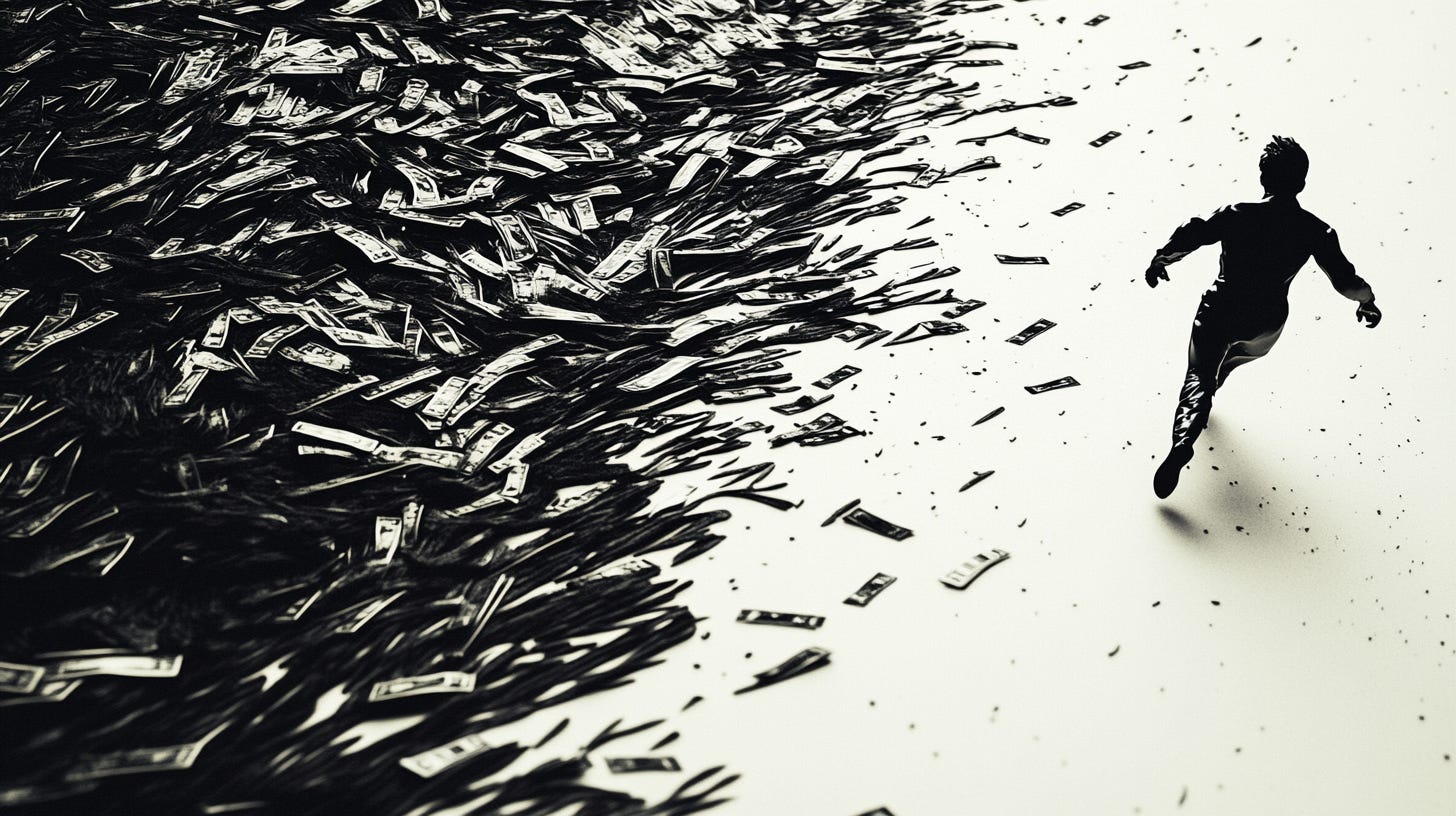
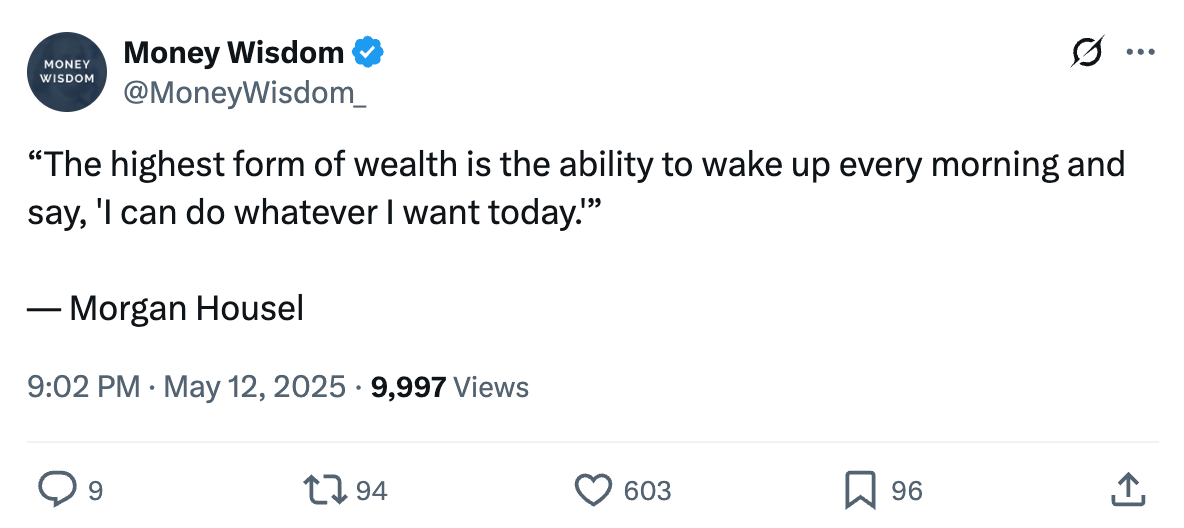
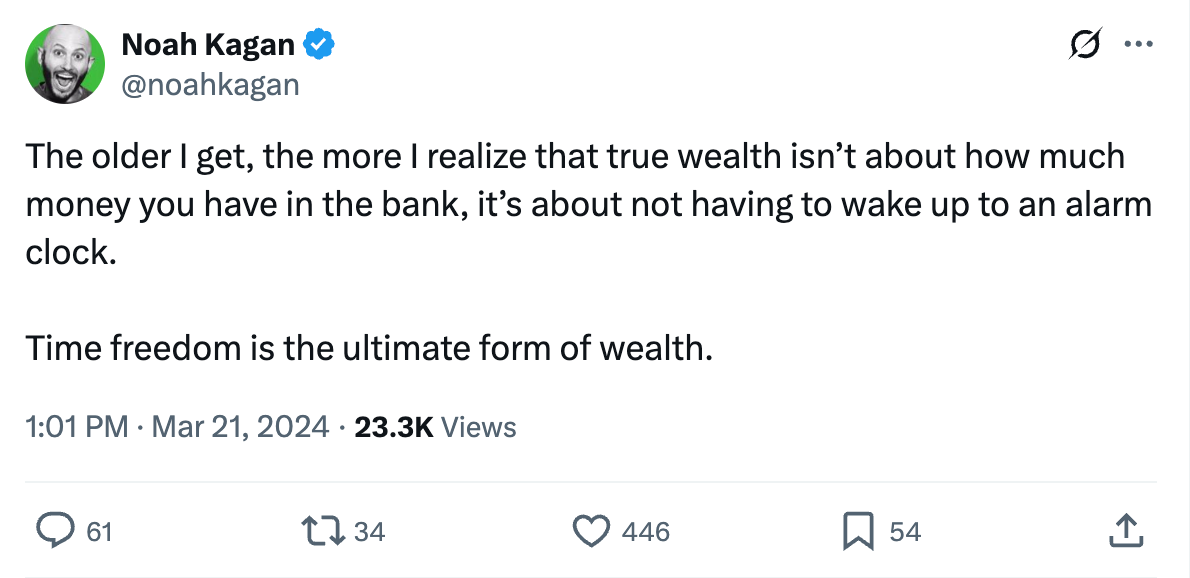
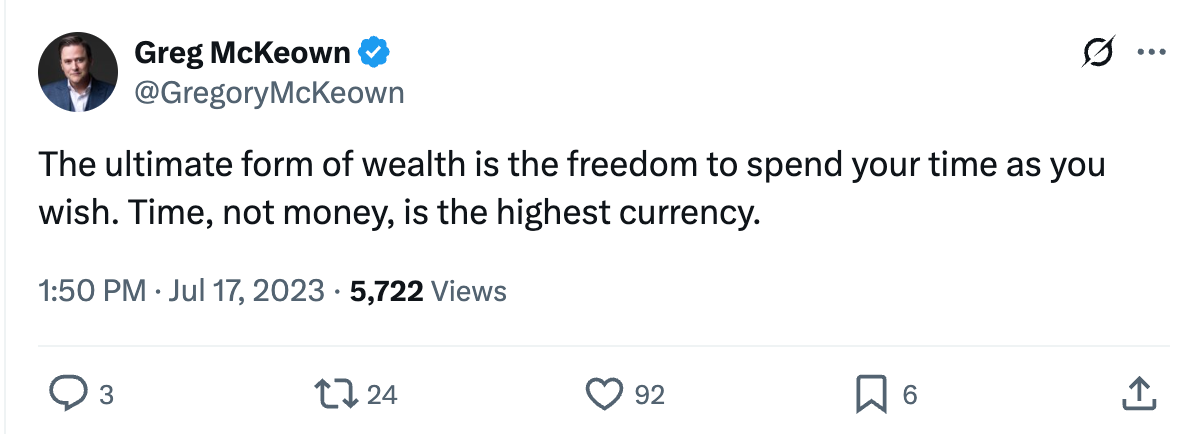
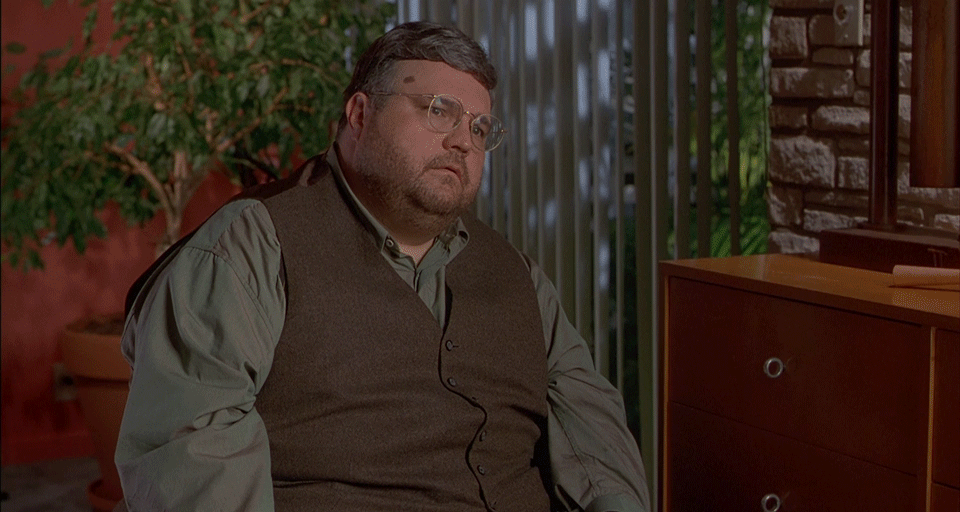

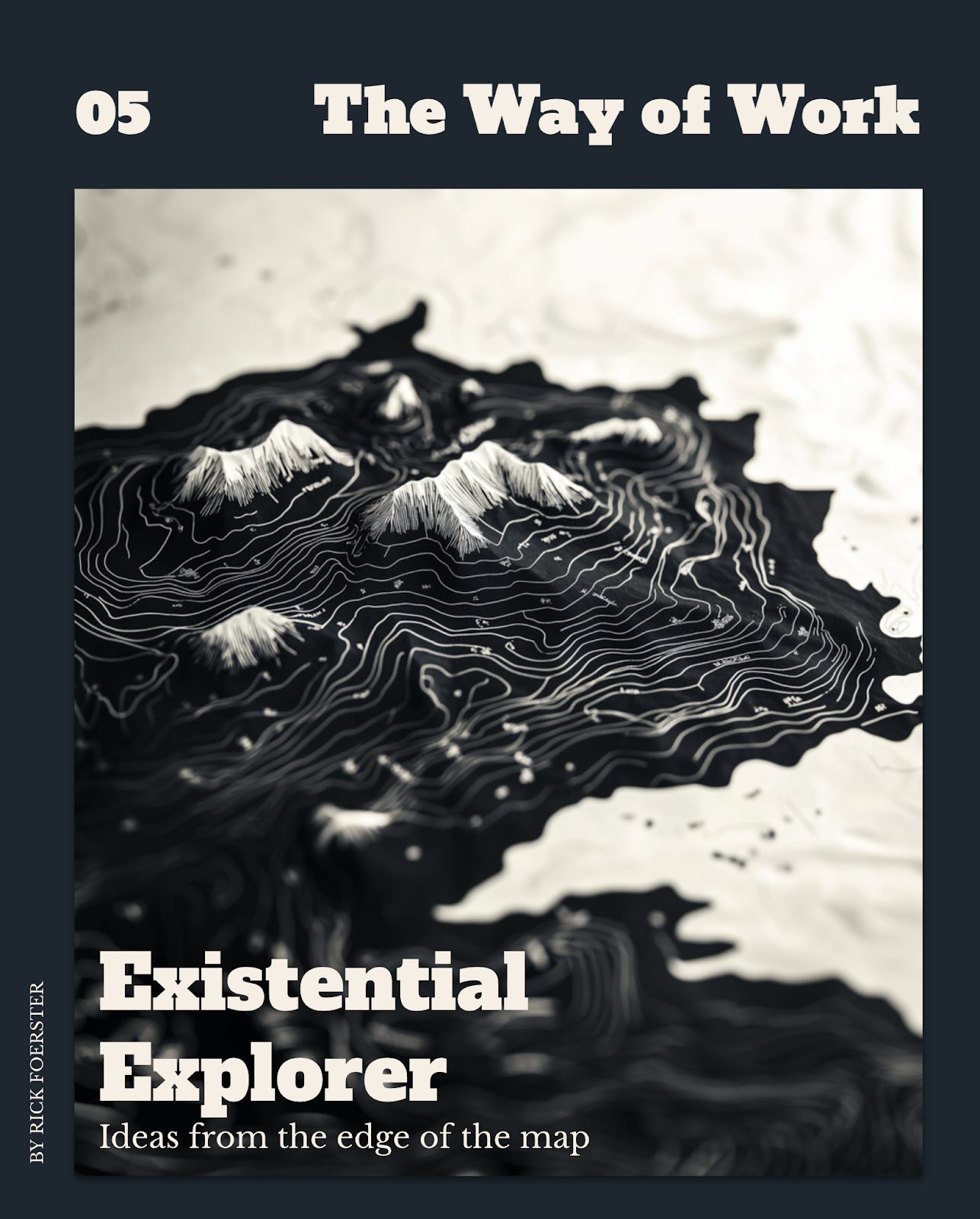
Hey Rick, we discussed this topic a while back on one of my posts, at the time I suggested Freedom was the highest aim, you suggested Meaning was. Well like you, after nearly 2 years of "freedom" I have come around to your way of thinking. At the time I was trying to define freedom not as time/money freedom, which is what most people think of, but I was trying to frame it as existential freedom. But after thinking (and living) it out, I think what I was really trying to define was in fact Meaning. I do still differentiate time/money freedom vs existential freedom as a material vs spiritual contrast, but at the end of the day, there can be no existential freedom without some kind of undergirding meaning.
Put more simply: a person without freedom but who has meaning can live a rich and rewarding life, even if it's a struggle at times. But a person with freedom and no meaning is destined for ennui, listlessness, purposelessness, etc which are all a form of privileged existential suffering.
In practice I'm still working out what all of the above mean for me, I find myself oscillating between enjoying my freedom but wrestling frequently with what to do with said freedom. At many points over the past couple years I've found myself asking, "What am I doing here?", (not geographically but existentially) which is a meaning question, not a freedom question.
Really appreciated this read. It’s a good reminder that aimless wandering won’t bring more fulfillment than grinding 90-hour weeks, but having the freedom to pursue meaning on your own terms is what makes all the struggle worthwhile. Excited to see where your book project goes!